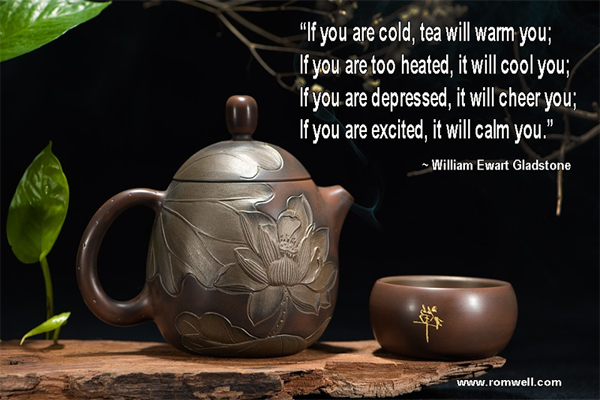Poets on Tea
"If you are cold, tea will warm you;
If you are too heated, it will cool you;
If you are depressed, it will cheer you;
If you are excited, it will calm you."~ William Ewart Gladstone
Poets and verse-makers joined the chorus in praise of tea, in Greek and Latin. One poet pictures Hebe pouring the delightful cup for the goddesses, who, finding it made their beauty brighter and their wit more brilliant, drank so deeply as to disgust Jupiter, who had forgotten that he, himself,
"Drank tea that happy morn,
When wise Minerva of his brain was born."
Laureant Tate, who wrote a poem on tea in two cantos, described a family jar among the fair deities, because each desired to become the special patroness of the ethereal drink destined to triumph over wine. Another versifier exalts it at the expense of its would-be rival, coffee:
"In vain would coffee boast an equal good,
The crystal stream transcends the flowing mud,
Tea, even the ills from coffee spring repairs,
Disclaims its vices and its virtues shares."
Another despairing enthusiast exclaims:
"Hail, goddess of the vegetable, hail!
To sing thy worth, all words, all numbers, fail!"
The new beverage did not have the field all to itself, however, for, while it was generally admitted that
"Tea was fixed, and come to stay.
It could not drive good meat and drink away."
Lovers of the old and conservative customs of the table were not anxious to try the novelty. Others shied at it; some flirted with it, in tiny teaspoonfuls; others openly defied and attacked it. Among the latter were a number of robust versifiers and physicians.
"'Twas better for each British virgin,
When on roast beef, strong beer and sturgeon,
Joyous to breakfast they sat round,
Nor were ashamed to eat a pound."
The satirists believed that tea had a contrary effect upon the acid humors of the mind, making the tea-table the arena for the display of the feminine capacity for backbiting and scandal. Listen to Swift describe a lady enjoying her evening cups of tea:
"Surrounded with the noisy clans
Of prudes, coquettes and harridans.
Now voices over voices rise,
While each to be the loudest vies;
They contradict, affirm, dispute,
No single tongue one moment mute;
All mad to speak, and none to hearken,
They set the very lapdog barking;
Their chattering makes a louder din
Than fish-wives o'er a cup of gin;
Far less the rabble roar and rail
When drunk with sour election ale."
Even gentle Gay associated soft tea with the temper of women when he pictures Doris and Melanthe abusing all their bosom friends, while--
"Through all the room
From flowery tea exhales a fragrant fume."

Great Beverages
Find delicious and easy to prepare beverages quite capable to satisfy your cravings...Did You Know?
Tea began as a medicine and grew into a beverage. In China, in the eighth century, it entered the realm of poetry as one of the polite amusements. The fifteenth century saw Japan ennoble it into a religion of aestheticism—Teaism. Teaism is a cult founded on the adoration of the beautiful among the sordid facts of everyday existence. It inculcates purity and harmony, the mystery of mutual charity, the romanticism of the social order. It is essentially a worship of the Imperfect, as it is a tender attempt to accomplish something possible in this impossible thing we know as life.
The earliest record of tea in European writing is said to be found in the statement of an Arabian traveller, that after the year 879 the main sources of revenue in Canton were the duties on salt and tea. Marco Polo records the deposition of a Chinese minister of finance in 1285 for his arbitrary augmentation of the tea-taxes. It was at the period of the great discoveries that the European people began to know more about the extreme Orient. At the end of the sixteenth century the Hollanders brought the news that a pleasant drink was made in the East from the leaves of a bush. The travellers Giovanni Batista Ramusio (1559), L. Almeida (1576), Maffeno (1588), Tareira (1610), also mentioned tea. In the last-named year ships of the Dutch East India Company brought the first tea into Europe. It was known in France in 1636, and reached Russia in 1638. England welcomed it in 1650 and spoke of it as "That excellent and by all physicians approved China drink, called by the Chineans Tcha, and by other nations Tay, alias Tee."
There is a subtle charm in the taste of tea which makes it irresistible and capable of idealisation.

